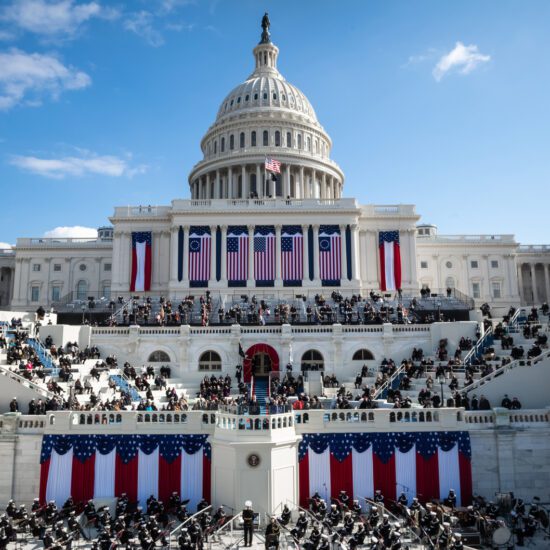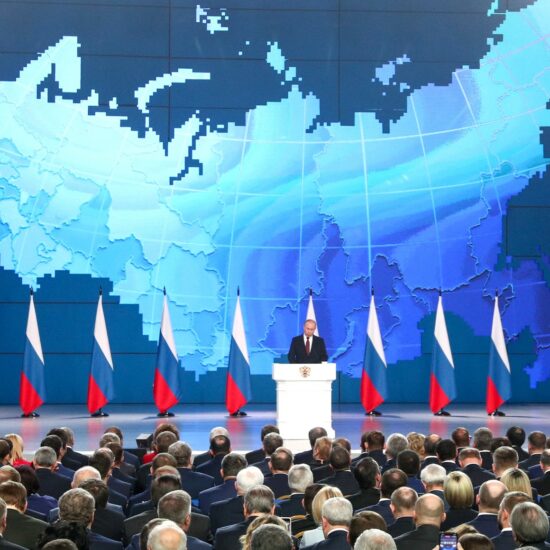
Image credit: Taras Gren
Proxy wars represent a most dangerous game in great power competition. Danger here has two dimensions. First, easy and early success can trigger strategic euphoria in the proxy-master. The empire can be swept up by the tantalizing prospect of a great strategic victory, paying a small price in treasure and nothing of its own blood. This leads directly to occluded judgment. Victory, so desired, is suddenly believed to be almost at hand, so why not pile on, and bring a hated rival quickly to defeat? This dynamic leads to“opportunistic escalation”.
The second strategic danger emerges when early success turns into a proxy enterprise at risk of failure, when reality breaks through and victory can no longer necessarily be achieved by proxy efforts alone. Easy and early victory is replaced by the prospect of possible failure, unless the great power “goes all in.” The prospect of losing the proxy war becomes as loathsome as seeing one’s own battalions beaten in battle. Here, the collective ecstasy of victory through proxy makes proxy abandonment and defeat unacceptable, leading to ever-intensifying, “double down escalation” that could invite direct war.
In light of Washington’s ongoing proxy war with Russia in Ukraine, these two dangers now threaten the American nation. Once Vladimir Putin decided to invade Ukraine, NATO enthusiastically embraced proxy war against Russia.
Yet, much of Washington’s understanding of proxy war effectiveness comes from Cold War-era memories of twin successes: U.S. proxy war against the Soviets in Afghanistan and the Soviets’ own proxy war against the United States in Vietnam. And that is just where the trouble lies. Our collective memory goes back no further than Vietnam and Afghanistan, but the proxy wars we no longer remember are far more instructive.
The American nation, in fact, survived as an imperial target in two great-power proxy wars: one, from 1776-78, in which a fledgling republic served as the proxy of a Franco-Spanish Bourbon proxy-master; and the other, from 1861-63, in which the British Empire targeted a beleaguered Union, using the Confederate States of America as its eager proxy.
Together, these two experiences form an historical counterpoint. 1776-78 is an example of a dual-empire (France-Spain) seduced by a siren America, fervently embracing opportunistic escalation, only to fall prey to double-down escalation. This in turn led to the 18th century’s third “world war”, which initiated the downfall of the Bourbon dynasties and their ancien régimes.
1861-63 is the counterpoint. At first, Britain embraced an opportunistic proxy war. Yet Whitehall resisted the seduction of a not-so-siren Confederacy. When faced with a crisis that presaged a strategic catastrophe for the Empire, Britain cut its losses, pulled back proxy support, and restored friendly relations with the United States postwar.
Proxy (no) Panacea
Using a willing third party to fight for you against a detested rival power may seem like a dream come true. The proxy-master embroils its hated enemy in a destructive war, but the enemy can do more than punish the proxy in return.
Yet, great power proxy war is a snare and a delusion. The prospect of a low-risk, high-reward engagement is the dangling bait—a war-that-is-not-a-war—which promises all the upsides and none of the downsides of actual battle. The truth, however, is that losing a great power proxy war is just as much a defeat as if one’s own battalions had been vanquished in battle—not to mention that the great power loses here without even the honor of commitment and sacrifice.
But there are even more strange trappings in wars of this kind: When it comes to proxy war, short-term success is more dangerous than failure. Early victories in a great power proxy war promotes soaring, even ecstatic emotions, leading people and leaders alike to embrace maximalist war aims. The rush of emotion and the impression of victory, however, often occludes the strategic eye. The target of the proxy war may not, in fact, be yet defeated. Contrary to self-serving appearances, a wounded great power may not actually be broken. It may move from accepting you as a proxy enemy to tackling you directly as the main enemy.
Today’s United States is on a proxy collision course to open war with Russia. This is the warpath that seized France in the 1770s, and stands in marked contrast to the more careful proxy role Great Britain played in the 1860s.
The American Empire stands today at a proxy war fork in the road. Will we take the path of the Bourbon alliance in 1778-79, toward eventual world war, or will we, like Great Britain, pull back?
Une catastrophe: Or, Louis’ Doomed fête Americaine
In the globalized conflict that was the Seven Years War, Bourbon France and Spain were humiliated, stoking a desire for revenge. The American colonies’ rebellion against their English cousins thus presented an irresistible opportunity.
Once the colonies declared their independence in 1776, Versailles went all in on “lethal military aid”—90 percent of the Continental Army’s muskets were French—while sheltering American warships and privateers in their fortified Caribbean safe harbors. Moreover, France and Spain provided American revolutionaries with massive loans and aid in millions of gold livres, and as a bonus, numbers of high-ranking French military advisers in combat.
The French proxy war saved the colonial American war effort. When Britain lost a small field army at Saratoga, Versailles assumed victory to be near. The Court could no longer hold back its impulse to finish Britain off and, in the process, unravel London’s imperial holdings around the world. Together with his Bourbon cousin Spanish monarch Carlos III, Louis XVI doubled down on war.
France’s proxy war in America led to a global war, which ended in near-total victory for the Bourbon alliance in 1783. Second-order consequences, however, were felt immediately. War debt was crushing. By 1786 the French finance and tax system was unable to manage debt service which was exceeding half the national budget. Runaway inflation and tax resistance cascaded into the French Revolution. 1789 led to 25 years of crisis and war that eventually brought down the entire Franco-Spanish globe-wide empire and the ancien régime with it.
Benjamin Franklin, a honey-tongued American Casanova of imperial court intrigue, was highly responsible for setting Versailles on the path of downfall. In his beaver hat and homespun clothes, he was the loveable beau savage and honest frontiersman that ci-devants courtiers and ladies so desired to see.
In Franklin’s insinuated narrative, 1) American victory was inevitable; 2) Victory needed a full French buy-in to achieve; 3) This victory would redound to French Enlightenment values; and, 4) Britain was an imperial paper tiger, demoralized and incompetent, so for France there was little to lose (and, in their starstruck eyes, a world to gain).
Franklin won over Versailles just as Volodymr Zelensky has lately melted the hearts of NATO ministers and American cosmopolitans alike. When the bedazzled imperial court succumbs to the charms of its self-created mesmeric client, the patron is in trouble.
Britain’s Pyrrhic Proxy: Whitehall’s Restraint
In the 1850s, the United States and Russia were Britain’s greatest strategic rivals: the latter was a military threat, but the challenge from the former was economic and struck to the very heart of British world power. By 1860, the U.S. was the world’s biggest shipbuilder, with the biggest merchant marine. American GDP was on course to surpass the UK by 1870. Finally, Britain’s economy was hostage to the South’s “King Cotton.”
The American civil war was therefore a serendipitous strategic event for Britain on three levels. First, under false flag, the UK had free rein to raid the rival Yankee merchant fleet. Second, arming the Confederacy might split the American republic, with the Confederacy allied to Britain. A rump U.S. would be a diminished power, caught between Canada and the Confederate States of America. Third, in cultivating an alternative cotton industry in Egypt, the UK would be less dependent on American cotton, while making American cotton wholly dependent on British protection. This echoes contemporary U.S. policies (pursued more half-heartedly than Victorian Britain) to reduce strategic dependence on foreign minerals, semiconductors, and other resources.
For nearly three years (1861-63) the British Parliament conducted an aggressive proxy war against the United States. It armed the South with a million rifles and advanced artillery, and it established a strategic safe haven in Bermuda for Confederate blockade runners only a few hundred miles from Hatteras ports. The U.S. Navy asserted a legally recognized blockade on the South, yet the cream of the British battle fleet in Bermuda (aka Britain’s “Gibraltar of the West”) effectively nullified the interdict on Confederate commerce. Hence, Britain rendered the Union’s blockade significantly less effective without accosting a single Federal ship. Most provocatively, UK naval industries built, outfitted, and manned Confederate commerce raiders—which sank or drove the Yankee merchant fleet to other flags, and effectively destroyed Maritime America.
Britain’s proxy war on the Union federal state was, in the very near term, highly successful. Here it must be remembered that, although Whitehall may have preferred an independent Confederacy, Britain’s true goals were more limited: to slow American power, and most important, to eliminate the United States as a rival maritime power. With the Civil War, this objective was achieved — Yet within a decade the advantage gained had been emptied of strategic value. In spite of the tragic burden of civil war, a reunited U.S. still shot past UK GDP by 1870, Britain’s entire Empire economy by 1890, and then reduced London to strategic dependence on Washington by 1914. The best that can be said of Britain’s proxy war against America is that Parliament and No.10 showed strategic restraint.
In fact, Lincoln himself triggered this restraint. He invited the entire Russian fleet to spend the winter-to-spring of 1863 in New York and San Francisco. Russia was Britain’s avowed enemy after Crimea, so the specter of an alliance between two rising world powers—compounded by a shift in the British electoral opinion after the Emancipation Proclamation—prompted Whitehall to back off from its proxy arming of the Confederacy. Moreover, as penance, Britain in 1869 bowed to a massive sanction at the Hague for eviscerating the American merchant fleet (aka, the Alabama Claims).
Two Diverging Paths
Conducted under the auspices of NATO, America’s proxy war with Russia seems at a crossroads. The recent series of Russian bombings have exposed the hidden danger of such a war: an eyes-wide-shut entry into an escalatory spiral. This is no place from which to exercise restraint and push for a diplomatic ceasefire.
Moreover, proxy wars of living memory will not help the U.S. foreign policy establishment awaken to its strategic overreach. Russians and Americans of the Cold War actually inhabited a more stable standoff, in which two equals feared face-to-face confrontation and the dread certainty, once it started, of nuclear escalation. Truly existential nuclear fear imposed strategic caution and diplomatic tolerance. Hence, the Soviet proxy war against the U.S. in Vietnam and the UN in Korea, and the U.S. proxy war against the Soviets in Afghanistan, occurred within a framework of heightened restraint. Similarly, Britain was restrained in its proxy war against the Federal Army, from 1861-63, by the fear of losing Canada in a world war with the U.S. and Russia.
In contrast, the Bourbons’ headlong plunge into full global war in 1778 after two years of successful proxy war (which went superbly from the American perspective) was a profound misjudgment. In Versailles, only Turgot, the Navy Minister and former Finance Minister, opposed the expanding war, declaring that France could not afford even a proxy war. Unlike Franklin, however, Turgot was no pied piper, and the court had already flocked to the genial genius from Philadelphia.
Proxy seduction shows just how dangerous a relationship of psychological intimacy and emotional co-dependence between proxy and client can be. Moreover, as the great power makes the proxy its ward, its commitment to proxy welfare is assumed, leading inevitably to unbreakable empathy and solidarity. Hence, the proxy war effort becomes indistinguishable from any all-out great power war.. Indeed, the bond can become almost religious in its zeal, as we see everyday in the pious outpourings from the Twitterverse, Mainstream Media, and NATO Governments in support of the Western war effort in Ukraine. In contrast, Confederate envoys lacked the charm to propagate and solidify a weak Southern claim on British popular sentiment, which tanked quickly after the Emancipation Proclamation.
Proxy wars that spiral into full-on escalation and direct warfare can produce calamitous second order effects. This was the fate of France and its Ancien Régime. Great Britain only barely avoided a similar fate due to a prudent course correction that came because of its fear of a likely U.S.-Russian alliance (heralded by the Russian war fleet wintering in New York and San Francisco). Hegemonic proxy wars involving great powers risk going global by their very nature—an eventuality that threatens the very decline the great power fears most of all. Washington would be well-advised to look to the fateful lessons of history before doubling down on its latest proxy war against Russia.
Michael Vlahos (@Michalis_Vlahos) is a writer and author of the book ‘Fighting Identity’. He has taught war and strategy at Johns Hopkins University and the Naval War College. He is currently a Senior Fellow at the Institute of Peace & Diplomacy. He is a weekly contributor to ‘The John Batchelor Show’. Follow him through his blog: anewcivilwar.com.










